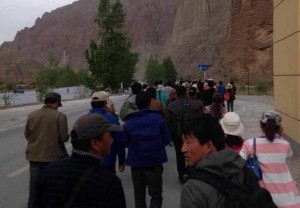Frustrated by substantial inequalities in pay conditions, more than 100 Tibetan school teachers launched a protest in Tibet’s Mahlo Prefecture on May 7, beginning a march to provincial headquarters in Qinghai in order to demand better pay, increased benefits, and equal pay for equal work.
The teachers first aired their grievances on April 30, when roughly 160 instructors participated in a sitting protest outside Mahlo Prefecture’s government offices. When the teachers’ concerns were not addressed, the group of instructors took more decisive action, setting off to make their demands known at in the provincial capitol.
The teachers, mostly Tibetan and a small number of Han Chinese, are certified instructors of primary and middle school from Mahlo’s Rebgong County. Local sources state that though they work full-time, the teachers are given the title “substitute” or “contractor.” This hiring practice has enabled local schools to deny the “substitute” instructors the same salary that full-time teachers receive, though they do equal work.
Regular teachers in the Rebgong region earn between 3,000 and 5,000 Yuan ($479 to $799 US) per month; the “substitute” teachers only receive up to one-sixth of that salary, ranging from 500 to 1,000 Yuan ($80 to $160 US) per month. In addition, “substitute” teachers do not receive benefits (such as medicare and promotions) equal to those of regular full-time instructors.
“The substitute teachers have continued their work in the hope [that their status] will be ‘regularised’… but the authorities have ignored their requests and demands…so they decided to march to Xining to present their case to provincial authorities,” an anonymous source from the protest said.
The protestors also claim to be treated poorly by Chinese authorities: “Many teachers in some schools have been treated more like servants” a local source said.
The protest march reflects broader issues in Tibetan employment: as more Han Chinese move to Tibet to seek a living, Tibetans are often marginalised in the employment marketplace, especially as fluency in Chinese becomes an increasingly common prerequisite for employment. Oftentimes, when Tibetans are able to find work, they face temporary work-statuses, low pay, and few (if any) benefits.





 Print
Print Email
Email